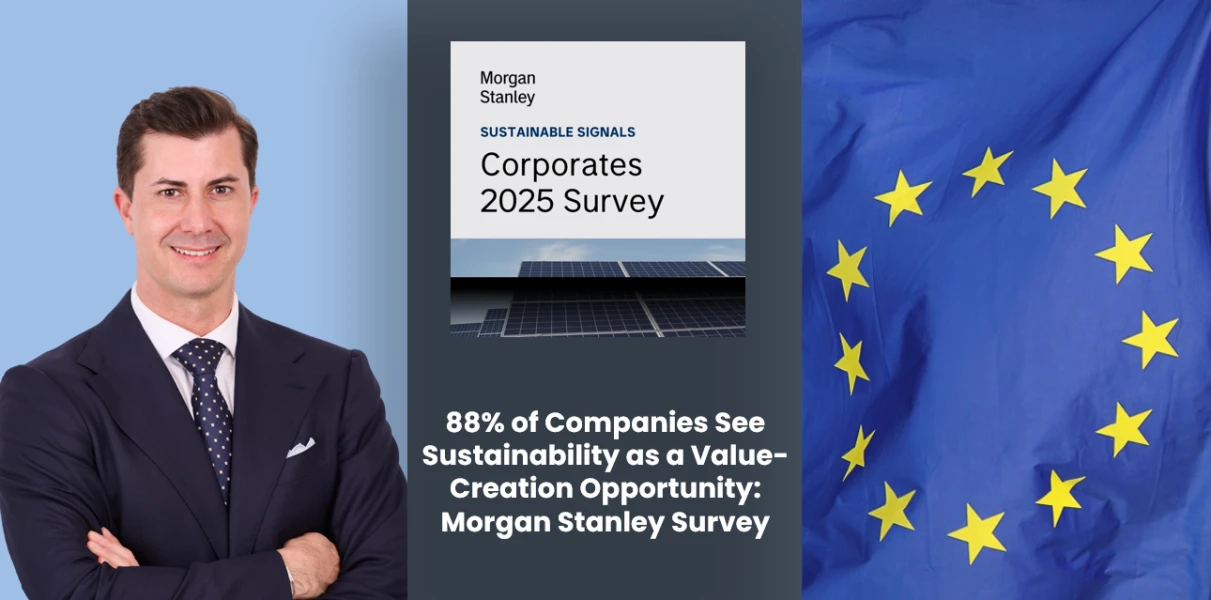Sustainability as a value driver: From the Morgan Stanley study to the VSME standard

The new Morgan Stanley study “Sustainable Signals: Corporates 2025” highlights what many market observers have long recognized: sustainability is no longer a cost factor, but a key value driver. 88 percent of the companies surveyed state that sustainability has a positive impact on long-term value creation – in Europe, the figure is as high as 94 percent.
Sustainability becomes measurable and comparable
Particularly interesting: 83% of the companies surveyed are now able to quantify the return on investment (ROI) of their sustainability measures. This puts sustainability projects on a par with traditional investment decisions – a clear indication that ESG (environmental, social, governance) issues have become an integral part of modern capital allocation.
The most important effects that companies associate with sustainability are:
Higher profitability (25% of responses),
Revenue growth (19%),
Lower capital costs and better cash flow visibility (13% each).
European dimension: CSRD and EU taxonomy
The Morgan Stanley results reflect the reality in Europe. With the Corporate Sustainability Reporting Directive (CSRD), the EU has created a world-leading regulatory framework. It initially requires large companies, but in future also many medium-sized companies, to provide comprehensive sustainability reporting.
In its latest statement, the EU Platform on Sustainable Finance warns against restricting the scope of the CSRD too much. A withdrawal would not only weaken the data available to investors, but also undermine the credibility of the EU financial market. For companies, this means that CSRD compliance is not a nice-to-have, but a key element in securing access to capital and markets.
VSME and the VSME standard – simplification for SMEs
An important aspect of the CSRD debate is the role of medium-sized enterprises. This is where the concept of VSME (Voluntary Standards for SMEs) comes into play. The VSME standard was developed by EFRAG to enable non-capital market-oriented companies to take a pragmatic approach to sustainability reporting.
While large companies have to apply complex ESRS (European Sustainability Reporting Standards), the VSME standard allows for streamlined, voluntary reporting that is still compatible with the expectations of banks, investors, and major business partners. The VSME standard thus closes the gap between regulatory requirements and the resources of small and medium-sized enterprises.
Supervision and risk management: Sustainability is a matter for top management
In its guidelines on dealing with sustainability risks, the Austrian Financial Market Authority (FMA) emphasizes that physical risks (e.g., extreme weather, flooding, heat waves) and transition risks (e.g., CO₂ pricing, stricter building regulations) are already having a significant impact on companies today.
If sustainability risks are not integrated into corporate strategy, there is a risk of rising costs, loss of asset value, or even loss of market access. Banks and insurance companies in particular are increasingly taking sustainability factors into account in their credit and risk policies – companies without reliable data are falling behind.
Digitization and reporting hurdles
At the same time, the German DRSC (German Accounting Standards Committee) is calling for a pragmatic implementation of reporting requirements. While the integration of CSRD reports into digital formats such as ESEF/XBRL is necessary, it should not lead to an excessive burden. This shows that even in digitization, a balance must be struck between investment security, transparency, and cost awareness.
What does this mean for medium-sized companies?
Even though many medium-sized companies are not directly affected by the first wave of CSRD reporting, the issue cannot be ignored. Reasons for this:
Financing: Banks require sustainability data in order to fulfill their own reporting obligations. Without transparent information, financing costs rise or access to credit is restricted.
Supply chains: Large companies must make their value chains transparent according to CSRD criteria – and pass this pressure on to their suppliers.
Competitiveness: Customers, investors, and talent increasingly expect clear sustainability strategies.
The VSME standard offers an opportunity here: medium-sized companies can introduce simplified reporting at an early stage, systematically collect sustainability information, and thus strengthen their position in supply chains and on the capital market.
Conclusion: Sustainability is an economic reality
The Morgan Stanley study, the EU Platform for Sustainable Finance, and the FMA guidelines all lead to the same conclusion: Sustainability is a strategic success factor. Companies that systematically collect sustainability information have better access to capital, enjoy greater resilience, and are better prepared for regulatory developments.
For medium-sized companies, this means laying the groundwork now.
Use the VSME standard to get started with reporting,
collect relevant data (energy, emissions, risks, opportunities),
and understand sustainability as part of your growth strategy.
Those who do their homework will not only ensure compliance, but also gain a tangible competitive advantage.